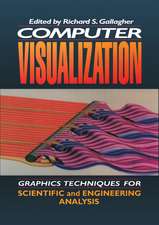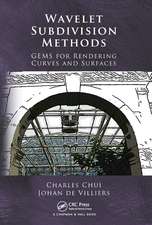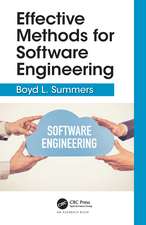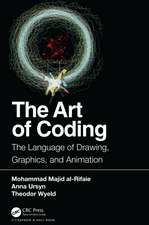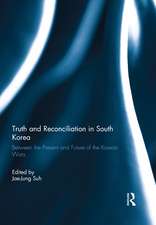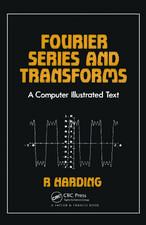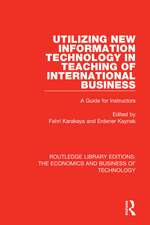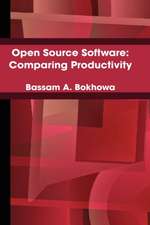Foundations and Practice of Research: Adventures with Dooyeweerd's Philosophy: Routledge Advances in Research Methods
Autor Andrew Basdenen Limba Engleză Hardback – 30 oct 2019
Such questions are material to the philosophies that guide research thinking in all fields, and since they cannot be satisfactorily addressed in a piecemeal fashion, this book employs the radically different philosophy of Herman Dooyeweerd to consider them together. Parts I and II discuss these issues theoretically and philosophically, while Part III discusses them practically, specifically the adventures that researchers across the world have had using Dooyeweerd's philosophy.
Foundations and Practice of Research assembles a wide range of experiences of using Dooyeweerd's philosophy in research in the fields of mathematics, the natural sciences, the social sciences, design sciences and the humanities. Case studies demonstrate how Dooyeweerd's philosophy has been found fruitful in most stages of research, and the philosophical discussion backs this up. This book challenges researchers to join the adventures, including suggestions of potential research that could be carried out, as well as questions still left unanswered.
| Toate formatele și edițiile | Preț | Express |
|---|---|---|
| Paperback (1) | 391.99 lei 6-8 săpt. | |
| Taylor & Francis – 30 iun 2021 | 391.99 lei 6-8 săpt. | |
| Hardback (1) | 1033.22 lei 6-8 săpt. | |
| Taylor & Francis – 30 oct 2019 | 1033.22 lei 6-8 săpt. |
Din seria Routledge Advances in Research Methods
-
 Preț: 151.97 lei
Preț: 151.97 lei -
 Preț: 309.99 lei
Preț: 309.99 lei - 8%
 Preț: 388.35 lei
Preț: 388.35 lei -
 Preț: 282.50 lei
Preț: 282.50 lei -
 Preț: 334.09 lei
Preț: 334.09 lei -
 Preț: 302.65 lei
Preț: 302.65 lei -
 Preț: 190.96 lei
Preț: 190.96 lei - 25%
 Preț: 768.46 lei
Preț: 768.46 lei -
 Preț: 361.28 lei
Preț: 361.28 lei -
 Preț: 370.41 lei
Preț: 370.41 lei - 31%
 Preț: 762.58 lei
Preț: 762.58 lei -
 Preț: 359.17 lei
Preț: 359.17 lei - 18%
 Preț: 1058.65 lei
Preț: 1058.65 lei -
 Preț: 356.44 lei
Preț: 356.44 lei - 18%
 Preț: 1053.92 lei
Preț: 1053.92 lei -
 Preț: 396.29 lei
Preț: 396.29 lei -
 Preț: 414.91 lei
Preț: 414.91 lei - 18%
 Preț: 1000.27 lei
Preț: 1000.27 lei -
 Preț: 483.49 lei
Preț: 483.49 lei - 18%
 Preț: 1057.13 lei
Preț: 1057.13 lei -
 Preț: 389.38 lei
Preț: 389.38 lei - 17%
 Preț: 850.68 lei
Preț: 850.68 lei - 18%
 Preț: 999.51 lei
Preț: 999.51 lei - 18%
 Preț: 1118.46 lei
Preț: 1118.46 lei - 18%
 Preț: 997.77 lei
Preț: 997.77 lei - 26%
 Preț: 652.84 lei
Preț: 652.84 lei -
 Preț: 456.06 lei
Preț: 456.06 lei -
 Preț: 489.26 lei
Preț: 489.26 lei - 18%
 Preț: 1000.27 lei
Preț: 1000.27 lei -
 Preț: 362.05 lei
Preț: 362.05 lei - 13%
 Preț: 336.80 lei
Preț: 336.80 lei - 18%
 Preț: 1107.47 lei
Preț: 1107.47 lei - 26%
 Preț: 764.20 lei
Preț: 764.20 lei -
 Preț: 387.99 lei
Preț: 387.99 lei - 25%
 Preț: 826.86 lei
Preț: 826.86 lei -
 Preț: 339.91 lei
Preț: 339.91 lei -
 Preț: 394.78 lei
Preț: 394.78 lei - 18%
 Preț: 1061.36 lei
Preț: 1061.36 lei - 26%
 Preț: 764.20 lei
Preț: 764.20 lei - 18%
 Preț: 1055.66 lei
Preț: 1055.66 lei
Preț: 1033.22 lei
Preț vechi: 1260.02 lei
-18% Nou
Puncte Express: 1550
Preț estimativ în valută:
197.72€ • 207.90$ • 163.36£
197.72€ • 207.90$ • 163.36£
Carte tipărită la comandă
Livrare economică 17 aprilie-01 mai
Preluare comenzi: 021 569.72.76
Specificații
ISBN-13: 9781138720688
ISBN-10: 1138720682
Pagini: 368
Ilustrații: 15 Tables, black and white
Dimensiuni: 152 x 229 x 28 mm
Greutate: 1.4 kg
Ediția:1
Editura: Taylor & Francis
Colecția Routledge
Seria Routledge Advances in Research Methods
Locul publicării:Oxford, United Kingdom
ISBN-10: 1138720682
Pagini: 368
Ilustrații: 15 Tables, black and white
Dimensiuni: 152 x 229 x 28 mm
Greutate: 1.4 kg
Ediția:1
Editura: Taylor & Francis
Colecția Routledge
Seria Routledge Advances in Research Methods
Locul publicării:Oxford, United Kingdom
Public țintă
PostgraduateCuprins
List of Tables
List of Figures
Preface
Acknowledgements
Chapter 1. Introduction
Chapter 2. Research and Everyday Experience
Chapter 6. On Theoretical Knowledge and Research
Chapter 9. Dooyeweerd's Suite of Aspects
CHAPTER 12. Criticisms of Dooyeweerd
Index
List of Figures
Preface
Acknowledgements
Chapter 1. Introduction
1-1. ADVENTURES WITH DOOYEWEERD'S PHILOSOPHY
1-2. RESEARCH1-2.1 The Mandate of Research1-3. PRACTICE
1-2.2 Clarifying Concepts Used in This Book
1-2.3 Some Requirements for Research
1-2.4 Research Content, Activity and Application
1-2.5 Range of Fields
1-4. FOUNDATIONS1-4.1 Foundations of Research1-5. GUIDE FOR READERS
1-4.2 Philosophy
1-4.3 Dooyeweerd and Philosophy
1-4.4 Resources
PART I1-5.1 The Structure of the Book
1-5.2 Some Tips on Reading
Chapter 2. Research and Everyday Experience
2-1. SOME PRELIMINARIESChapter 3. Diversity and Coherence2-1.1 Differences Between Research and Everyday Experience2-2. THE RESEARCHER-WORLD RELATIONSHIPS: DETACHED OR PARTICIPANT OBSERVER?
2-1.2 Relationships Between Research and Everyday Experience2-2.1 Is Detached Observer Possible?2-3. THE RELATIONSHIP BETWEEN THEORETICAL AND PRE-THEORETICAL THINKING
2-2.2 Is Detached Observer Desirable?
2-2.3 Dooyeweerd's View of the Researcher-World Relationship2-3.1 Is Neutral Theoretical Thinking Desirable?2-4. THE VALUE OF THEORETICAL AND PRE-THEORETICAL KNOWLEDGE
2-3.2 Is Neutral Theoretical Thinking Possible?
2-3.3 Dooyeweerd's View of Theoretical and Pre-theoretical Thinking
2-5. UNDERSTANDING EVERYDAY, PRE-THEORETICAL EXPERIENCE2-5.1 Interest in Everyday Experience2-6. EVERYDAY EXPERIENCE AND RESEARCH
2-5.2 Appealing to Everyday Experience
2-5.3 Starting with Everyday Experience2-6.1 The Everyday Experience of Applying Research2-7. CONCLUSIONS
2-6.2 Research Activity as Everyday Experience
2-6.3 Everyday Experience in Research Content
3-1. A PHILOSOPHICAL LOOK AT DIVERSITY AND COHERENCEChapter 4. Meaning in Research and Reality, and an Overview of Dooyeweerd's Understanding of Reality
3-2. DOOYEWEERD'S ASPECTS3-2.1 An Initial Look At Diversity3-3. DIVERSITY AND COHERENCE OF RESEARCH ACTIVITY
3-2.2 Aspects as Modes
3-2.3 Irreducibility of Aspects
3-2.4 Inter-aspect Coherence3-2.4.1 Aspectual simultaneity
3-2.4.2 No conflict among aspects
3-2.4.3 Inter-aspect analogy
3-2.4.4 Inter-aspect dependency
3-2.4.5 The Order of Aspects
3-4. DIVERSITY AND COHERENCE OF RESEARCH APPLICATION
3-5. DIVERSITY AND COHERENCE IN RESEARCH CONTENT (THEORIES)3-5.1 Diversity and Coherence of Research Fields3-6. CONCLUSION
3-5.2 Diversity and Coherence of Data Collected in Research
3-5.3 Diversity and Coherence Within Concepts
3-5.4 Diversity and Coherence in Research Findings / Theories
4-1. PRELIMINARIESChapter 5. Research and Philosophy
4-2. TREATMENT OF MEANING IN PHILOSOPHY
4-3. MEANINGFULNESS AS THE FOUNDATION FOR ONTOLOGY, EPISTEMOLOGY AND AXIOLOGY4-3.1 Diversity and Coherence of Meaning4-4. POTENTIAL RELEVANCE FOR RESEARCH
4-3.2 Aspects: Spheres of Meaningfulness
4-3.3 Meaningfulness as the Ground of Being
4-3.4 Types and Identity
4-3.5 Structural Relationships
4-3.6 Meaning and Rationality
4-3.7 Meaning, Value and Good
4-3.8 Law, Functioning and Repercussion4-3.8.1 Law: the possibility of functioning and repercussion4-3.9 Subject and Object in Terms of Meaningfulness and Law
4-3.8.2 Multi-aspectual functioning
4-3.8.3 Society, progress and meaningfulness
4-3.8.4 Meaningful properties and functional relationships
4-3.10 Prior Meaningfulness and the Metaphor of Ocean
4-3.11 Towards a Model of Meaning4-3.11.1 The proposed model4-3.12 Meaningfulness and Knowing the World
4-3.11.2 Application to philosophy
4-3.13 Knowing Meaningfulness Itself: Delineating the Aspects
4-3.14 Meaning, Time and Self4-4.1 Meaningfulness and Research Application4-5. CONCLUSION
4-4.2. Meaningfulness and Research Activity
4-4.3 Meaning and Research Content
5-1. ROLES OF PHILOSOPHY IN RESEARCHPART II5-1.1 Ontology, Epistemology and Axiology5-2. LEVELS OF PRESUPPOSITION
5-1.2 Philosophy as Approach
5-1.3 Philosophy as Foundation
5-1.4 Philosophy as Source of Conceptual Tools and Methods5-2.1 Worldviews5-3. STANDPOINTS
5-2.2 Ground-motives
5-2.3 Ground-motives as Presuppositions not Truths
5-2.4 Differences Between Dialectical and Pluralist Ground-motives5-3.1 Problems Resulting from the Immanence Standpoint5-4. THE DEVELOPMENT OF DOOYEWEERD'S PHILOSOPHY
5-3.2 Alternative Standpoints
5-3.3 Towards a Different Standpoint5-4.1 Struggles with the Immanence Standpoint5-5. CROSSING RESEARCH PHILOSOPHY BOUNDARIES
5-4.2 Seeking a "Christian" Philosophy
5-4.3 Fresh Insights for Research
5-6. CONCLUSION
Chapter 6. On Theoretical Knowledge and Research
6-1. THE CHALLENGE OF TRUTHChapter 7. Ground-Ideas: How Philosophies Work6-1.1 Realism and Anti-Realism: Is There Generic Truth?6-2. ON THE NON-NEUTRALITY OF THEORETICAL THOUGHT
6-1.2 About Truth
6-1.3 Dooyeweerd's Critique of Truth6-2.1 Dooyeweerd's Immanent Critique of Theoretical Thought6-3. DOOYEWEERD'S SECOND TRANSCENDENTAL CRITIQUE OF THEORETICAL THOUGHT
6-2.2 Dooyeweerd's Transcendental Critiques of Theoretical Thought6-3.1 Preparing to Understand the Transcendental Problems6-4. DOOYEWEERD'S PERSPECTIVE ON TRUTH
6-3.2 The Starting Question
6-3.3 First Transcendental Problem (TP1), Abstraction: Thinker and Diversity of World
6-3.4 Second Transcendental Problem (TP2), Reuniting That Which Was Set Asunder: Rationalities and Responsibility
6-3.5 Third Transcendental Problem (TP3), Grounds of Critical Self-Reflection: Origin of Meaning
6-3.6 Ground-motives as Origins of Meaning
6-3.7 Summary
6-5. CONCLUSION
7-1. DOOYEWEERD'S NOTION OF THREE-PART GROUND-IDEAChapter 8. Fields of Research7-1.1 Ground-Ideas of Philosophy: A Tool for LACE7-2. ON PROGRESS AND ADVANCE IN KNOWLEDGE
7-1.2 Diversity of World7-1.2.1 Data from the world7-1.3 Coherence of Rationalities
7-1.2.2 On sources of data
7-1.2.3 Secondary data and use of instruments
7-1.4 Wider Meaningfulness and Origin of Meaning
7-1.5 Ground-Idea Analysis: Example from Sociolinguistics
7-1.6 Reflection7-2.1 Clarification Offered by the Notion of Ground-Idea7-3. GROUND-IDEAS A BASIS FOR DIALOGUE
7-2.2 Accounts of Dialectic7-3.1 An Example: Positivist, Interpretivist and Socio-critical Approaches7-4. APPLICATIONS OF GROUND-IDEAS IN RESEARCH PROJECTS
7-3.2 Reflection7-4.1 Ground-Ideas as Research Philosophy7-5. CONCLUSION
7-4.2 On Bias in Research
8-1. UNDERSTANDING RESEARCH FIELDS AND DISCIPLINESPART III8-1.1 Some Approaches8-2. ON PARADIGMS
8-1.2 Fields as Centred on Aspects
8-1.3 Secondary Aspects
8-1.4 Wider Meaningfulness: Applications and Interdisciplinary Research
8-1.5 Conclusions About Fields8-2.1 The Idea of Paradigm8-3. CONCEPTS AND IDEAS IN A FIELD
8-2.2 A Dooyeweerdian View: Paradigms as Meaningfulness
8-2.3 An Example: Linguistics and Sociolinguistics
8-4. CONCLUSION
Chapter 9. Dooyeweerd's Suite of Aspects
9-1. DESCRIPTION OF EACH ASPECTChapter 10. The Complex Activity of Research9-1.1 The Quantitative Aspect9-2. GROUPING THE ASPECTS?
9-1.2 The Spatial Aspect
9-1.3 The Kinematic Aspect
9-1.4 The Physical Aspect
9-1.5 The Organic / Biotic Aspect
9-1.6 The Psychic / Sensitive Aspect
9-1.7 The Analytical Aspect
9-1.8 The Formative Aspect
9-1.9 The Lingual Aspect
9-1.10 The Social Aspect
9-1.11 The Economic Aspect
9-1.12 The Aesthetic Aspect
9-1.13 The Juridical Aspect
9-1.14 The Ethical Aspect
9-1.15 The Pistic Aspect
9-3. COMPARISON WITH OTHER SUITES
9-4. ON TRUSTING DOOYEWEERD'S SUITE
9-5. CONCLUSION
10-1. OVERALL APPROACH: "LACE"CHAPTER 11. Experience of Research Using Dooyeweerd10-1.1 The Elements of LACE10-2. RESEARCH AS MULTI-ASPECTUAL FUNCTIONING
10-1.2 Example of LACE with Information Systems Approaches
10-1.3 Examples of LACE with Foundations of Information Systems
10-3. THE MORE VISIBLE ASPECTS OF RESEARCH ACTIVITY
10-4. SOME LESS-OBVIOUS ASPECTS OF RESEARCH ACTIVITY10-4.1 Less-obvious Pistic Functioning in Research10-5. A CASE STUDY: ACTIVITIES IN A KNOWLEDGE PROJECT
10-4.2 Less-obvious Ethical Aspects in the Activity of Research
10-4.3 Less-obvious Juridical Functioning in Research
10-4.4 Less-obvious Aesthetic Functioning in the Activity of Research
10-4.5 Less-obvious Economic Functioning in Research
10-4.6 Less-obvious Social Functioning in Research
10-4.7 Less-obvious Lingual, Formative and Analytic Functioning in Research
10-4.8 The Early Aspectual Functioning in Research
10-6. CONCLUSIONS
11-1. STAGES OF RESEARCH USING DOOYEWEERDPART IV
11-2. UNDERSTANDING THE DISCOURSES AND LITERATURE OF A FIELD WITH DOOYEWEERD11-2.1 Methods Involving Ground-motives11-3. CONCEPTUAL FRAMEWORKS: DOOYEWEERDIAN ADVENTURES AMONG PARADIGMS
11-2.2 Joneidy's Analysis of Seminal Papers
11-2.3 Understanding Collections of Papers
11-2.4 More Complex Inter-Discourse Analysis11-2.4.1 Breems' study
11-2.4.2 Basden's study
11-2.4.3 Reflection on heatmaps11-3.1 Critique of Paradigms in Statistics11-4. CONCEPTUAL FRAMEWORKS: CLARIFYING CONCEPTS AND IDEAS
11-3.2 Paradigms and Frameworks in Systems Thinking
11-3.3 A Multi-aspectual Paradigm in Sustainability
11-3.4 A New Paradigm of the State and Civil Society
11-3.5 New Paradigm in Knowledge Management and Tacit Knowledge
11-3.6 New Paradigms and Frameworks in the Information Systems Field11-3.6.1 ISD: Information systems development, including programming11-3.7 Broadening Paradigms in Engineering
11-3.6.2 IT features
11-3.6.3 IT/IS use
11-3.6.4 IT and society
11-3.6.5 Nature of information and computers
11-3.8 Reflection11-4.1 Understanding a 'Simple' Concept: Diagrams11-5. USING DOOYEWEERD TO DISCUSS RESEARCH METHODS
11-4.2 Exploring a More Complex Concept: Idolatry
11-4.3 Multi-aspectual Concepts: Information, Documents
11-4.4 Complex Notions Inforporating Antecipations and Retrocipations
11-4.5 Contributing Ideas to Philosophy
11-6. DATA COLLECTION WITH DOOYEWEERD11-6.1 Using Aspects to Design Questionnaires11-7. USING DOOYEWEERD IN DATA ANALYSIS
11-6.2 MAKE: Multi-aspectual Knowledge Elicitation
11-6.3 MAIT: Multi-aspectual Interview Technique
11-6.4 Practical Reflections on MAKE and MAIT
11-6.5 Philosophical Reflections on MAKE and MAIT
11-6.6 Eliciting Detailed Expertise11-7.1 Simple Aspectual Analysis11-8. EXTENDING THESE IDEAS: NEW ADVENTURES AWAITED
11-7.2 Finding Hidden Meanings: What Motivated Seminal Papers11-7.2.1 The method11-7.3 Researching Everyday Down-to-earth Issues
11-7.2.2 Results
11-7.2.3 Challenges11-7.3.1 The first study11-7.4 Complex Quantitative Comparisons
11-7.3.2 The second and third studies
11-7.3.3 Quantitative and qualitative analyses
11-7.3.4 Comparative analyses
11-7.3.5 The value of extra, volunteered information
11-7.3.6 The literature versus everyday experience
11-7.3.7 Reflection on aspectual analysis of down-to-earth issues
11-7.5 Complex Qualitative Comparisons
11-7.6 Overview11-8.1 Using Dooyeweerd at Beginning and End of Research11-9. CONCLUSION
11-8.2 Using Dooyeweerd in Observation
11-8.3 Using Dooyeweerd in Natural and Mathematical Sciences
CHAPTER 12. Criticisms of Dooyeweerd
12-1. CRITICISMS OF DOOYEWEERD'S IDEASChapter 13. Summary and Conclusions12-1.1 Critiques of Dooyeweerd's Approach to Everyday Experience12-2. REFLECTION
12-1.2 Critiques of Dooyeweerd's View of Non-Neutrality or Non-Autonomy of Theoretical Thought
12-1.3 Critiques of Dooyeweerd's Approach to Diversity and Coherence
12-1.4 Critiques of Dooyeweerd's Idea of Meaning(fulness)
12-1.5 Critiques of Dooyeweerd's Notion of Being as Meaningfulness
12-1.6 Critiques of Dooyeweerd's idea of Good and Evil
12-1.7 Critiques of Dooyeweerd's idea of Aspectual Functioning
12-1.8 Critiques of Dooyeweerd's View of History and Progress
12-1.9 Critiques of Dooyeweerd's View of Ground-motives
12-1.10 Critiques of Dooyeweerd's Idea of the Immanence Standpoint
12-1.11 Critiques of Dooyeweerd's Transcendental Critiques of Theoretical Thought
12-1.12 Critiques of Dooyeweerd's idea of Antithesis between Christian and Non-Christian Thought
12-1.13 Critiques of Dooyeweerd's Aspects
13-1. SUMMARY OF CONTRIBUTIONS TO RESEARCHReferences13-1.1 Overall Benefits13-2. THE CHANGING WORLD OF RESEARCH
13-1.2 Contributions to Research Content
13-1.3 Contributions to Research Activity
13-1.4 Contributions to Research Application
13-3. COVERAGE OF DOOYEWEERD'S PHILOSOPHY
13-4. THE ADVENTURE IS JUST BEGINNING
Index
Notă biografică
Andrew Basden is Professor of Human Factors and Philosophy in Information Systems at the University of Salford, UK. He has been active in research for 40 of the past 50 years, informed by 12 years of professional practice.
Descriere
This book assembles a wide range of experiences of using Dooyeweerd's philosophy in research in the fields of mathematics, the natural sciences, the social sciences, design sciences and the humanities. Case studies demonstrate how Dooyeweerd's philosophy has been found fruitful in most stages of research.


